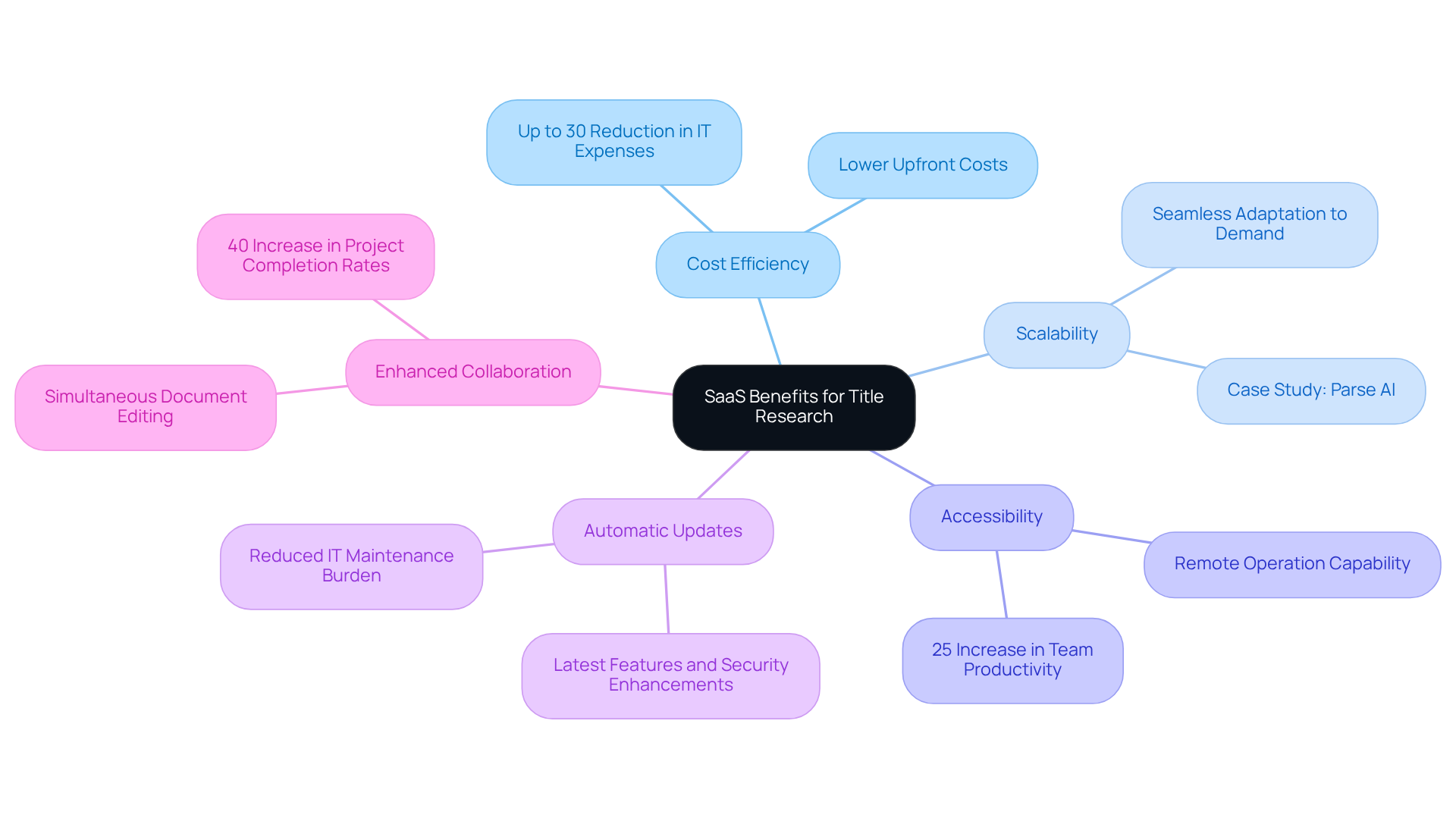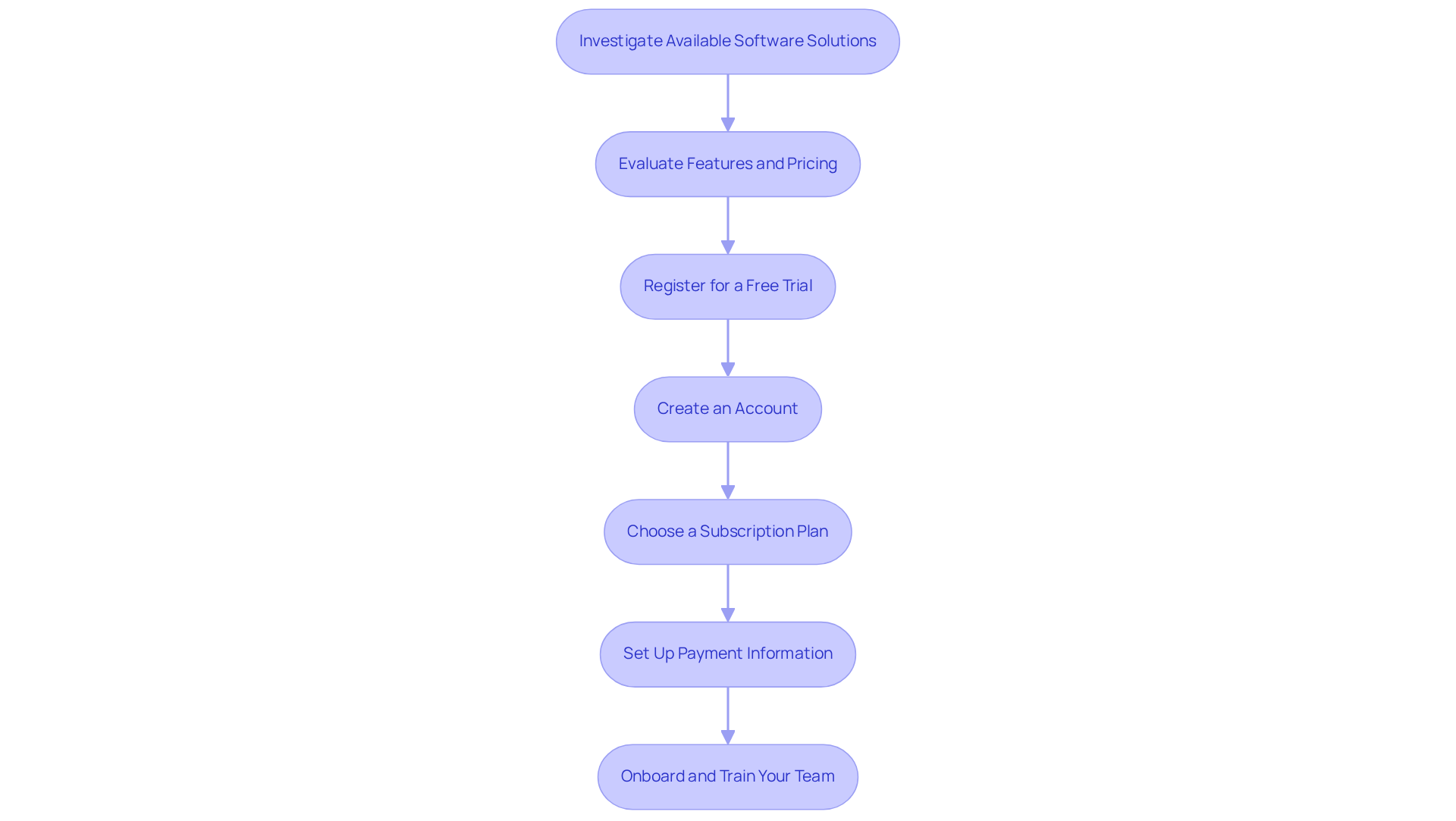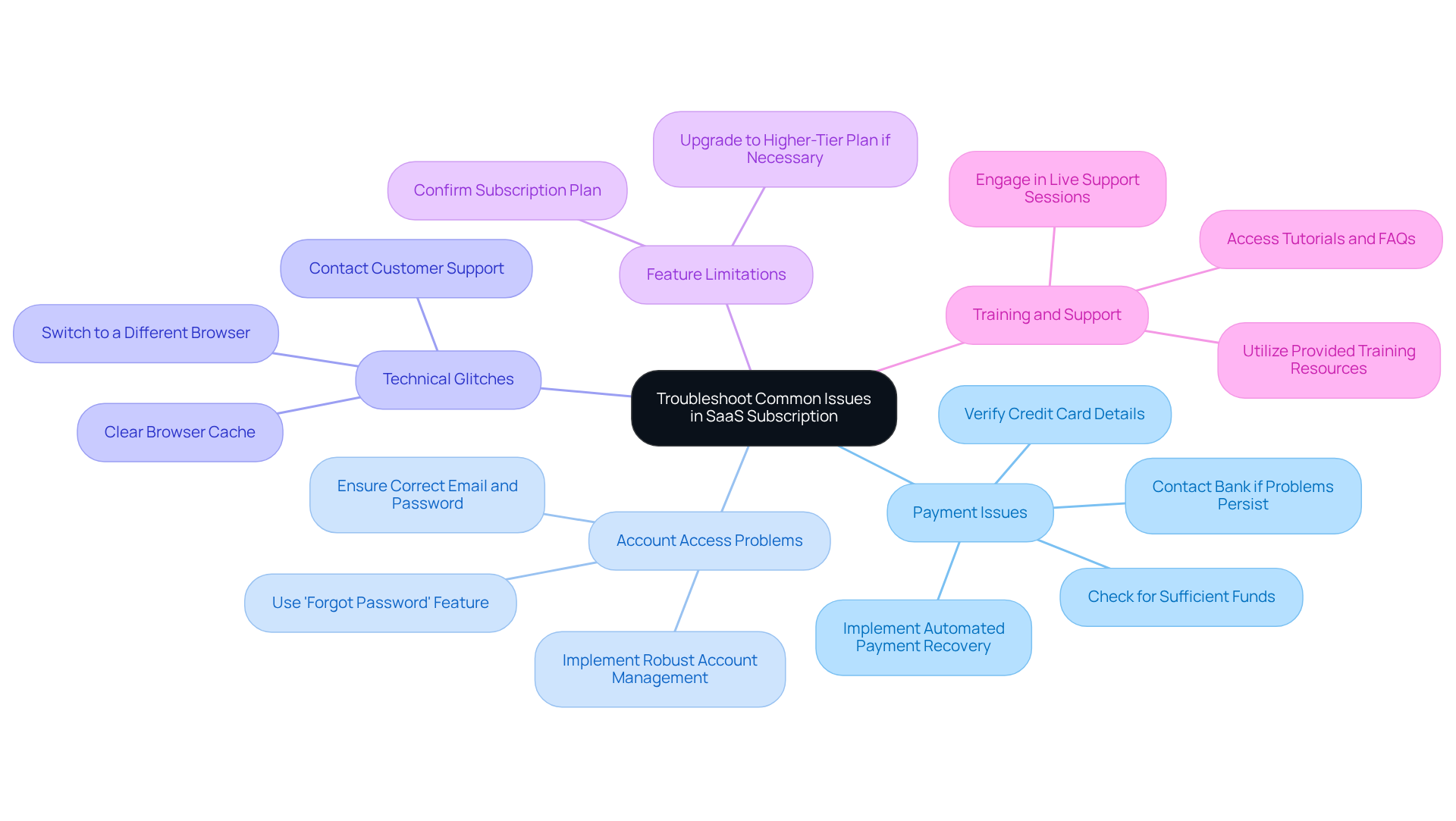Overview
The article presents a comprehensive guide for subscribing to title production SaaS, underscoring the advantages of such software while detailing the subscription process. It begins by highlighting the significance of accurate title research, which is essential in the industry. Furthermore, the article addresses the challenges faced in traditional methods and introduces SaaS as a robust solution. Adopting SaaS can significantly enhance efficiency and precision in title research, evidenced by notable cost savings, scalability, and improved collaboration features. Consequently, this software emerges as a vital tool for professionals seeking to streamline their operations and achieve greater accuracy.
Introduction
Navigating the complexities of title research is a significant undertaking, particularly in an environment where efficiency and accuracy are critical. Embracing Software as a Service (SaaS) offers title companies a transformative opportunity, providing a range of benefits that streamline processes and reduce costs. However, with a multitude of options available, organizations must carefully consider how to select the right SaaS solution and adeptly navigate the subscription process.
This guide outlines the essential steps for subscribing to title production SaaS, addressing common challenges and equipping title researchers with the knowledge necessary to enhance their operational efficiency.
Understand SaaS and Its Benefits for Title Research
Software as a Service (SaaS), commonly recognized as a cloud-based solution, empowers users to access software applications via the internet. For researchers in the field, embracing a software-as-a-service model can lead to marked enhancements in efficiency and precision. The key benefits include:
- Cost Efficiency: By removing the necessity for expensive hardware and software installations, SaaS enables title companies to significantly lower upfront costs. Industry research indicates that businesses can decrease IT expenses by up to 30% through the implementation of software-as-a-service solutions.
- Scalability: As organizations expand, software solutions can seamlessly scale to meet rising demands without necessitating substantial additional investments. For instance, the 'Parse AI: Revolutionizing Research on Titles' case study illustrates how software as a service can adapt to increasing demands in document research.
- Accessibility: With software applications accessible from any location with internet connectivity, title researchers can operate remotely, fostering improved collaboration among team members. This flexibility has been shown to enhance team productivity by 25%.
- Automatic Updates: Service providers manage software updates and maintenance, ensuring users benefit from the latest features and security enhancements without disruption. This alleviates the burden on IT staff, allowing them to concentrate on more strategic initiatives.
- Enhanced Collaboration: Numerous software-as-a-service platforms feature collaborative tools that permit multiple users to work on documents simultaneously, optimizing workflow efficiency. Industry leaders assert that effective collaboration tools can result in a 40% increase in project completion rates.
Understanding these benefits equips researchers to make informed decisions regarding the integration of cloud-based software, such as those that allow them to subscribe to , ultimately leading to improved efficiency and precision in research processes. As emphasized by industry specialists, "The acceptance of software as a service is not merely a trend; it is essential for remaining competitive in today's rapidly evolving real estate market.

Follow the Subscription Process for Title Production SaaS
Subscribing to a title production SaaS involves several straightforward steps:
- Investigate Available Software Solutions: Begin by identifying platforms that specialize in the production of titles. Look for reviews, case studies, and testimonials from other real estate professionals. For instance, the case study "Parse AI: Revolutionizing Title Research" highlights how Parse AI enhances efficiency and cost savings for title researchers.
- Evaluate Features and Pricing: Compare the characteristics provided by various software service providers. Consider factors such as data extraction capabilities, user interface, customer support, and pricing models. According to Vena Solutions, the worldwide software-as-a-service market is expected to expand notably, which emphasizes the importance of choosing to subscribe to title production SaaS.
- Register for a Free Trial: Many software providers offer free trials. Take advantage of this opportunity to test the platform's functionality and determine if it meets your needs.
- Create an Account: After you’ve chosen a software-as-a-service provider, visit their website and set up an account. You will typically need to provide basic information such as your name, email address, and company details.
- Choose a Subscription Plan: After creating an account, select a subscription plan that fits your budget and requirements. Be sure to review the terms and conditions before finalizing your choice.
- Set Up Payment Information: Enter your payment details to activate your subscription. Ensure that you understand the billing cycle and cancellation policy.
- Onboard and train your team by taking advantage of the onboarding resources offered by the software company once you subscribe to title production SaaS. This may include to help your team get up to speed.
In the words of a real estate expert, "The appropriate software solution can revolutionize our workflow and improve our precision in property research." Adhering to these procedures will guarantee a seamless transition to utilizing a production software, ultimately enhancing your efficiency and precision in research.

Troubleshoot Common Issues in SaaS Subscription
While users frequently encounter common challenges, can be a seamless process. Here’s how to effectively troubleshoot these issues:
- Payment Issues: If your payment fails, first verify that your credit card details are accurate and that sufficient funds are available. If problems persist, contacting your bank may be necessary. Notably, nearly 50% of subscription churn is attributed to failed payments, underscoring the importance of addressing this issue promptly. Parse AI offers flexible subscription options, including monthly and annual plans, as well as a pay-as-you-go model, ensuring that you can choose the best fit for your needs.
- Account Access Problems: In cases where login attempts are unsuccessful, ensure you are entering the correct email and password. Utilize the 'Forgot Password' feature if needed. Alarmingly, 36% of former employees continue to access their previous employer’s systems, highlighting the need for robust account management practices.
- Technical Glitches: If the platform is not performing as expected, consider clearing your browser cache or switching to a different browser. Should issues persist, reaching out to customer support is advisable. A significant percentage of organizations indicate that handling software-as-a-service proliferation continues to be a challenge, emphasizing the necessity for effective technical support. AI's customer success team is available to assist with any technical problems you may face, offering customized solutions to improve your experience.
- Feature Limitations: If certain features appear unavailable, confirm that you are subscribed to the appropriate plan, as some functionalities may be restricted to higher-tier subscriptions. In 2024, 53% of organizations consolidated redundant SaaS applications, indicating a trend toward optimizing feature access. With this AI, you can utilize advanced machine learning tools for document processing and title research automation, ensuring you have access to the features that enhance your workflow.
- Training and Support: If you or your team face challenges utilizing the system, take advantage of the training resources provided by Parse AI. Many platforms offer tutorials, FAQs, and live support to enhance user experience. Comprehensive onboarding can significantly reduce employee turnover and improve overall satisfaction, highlighting the value of effective training and support.
By proactively addressing these common issues, you can subscribe to title production SaaS and enhance your experience while ensuring a more efficient workflow.

Conclusion
Embracing a software-as-a-service (SaaS) model for title production signifies a transformative step for title researchers striving to enhance their efficiency and accuracy. The integration of cloud-based solutions not only streamlines operations but also positions organizations to remain competitive in a fast-paced real estate market. By comprehending the advantages of SaaS—including cost efficiency, scalability, and improved collaboration—title companies can make informed decisions that lead to substantial operational improvements.
The article presents a comprehensive step-by-step guide for subscribing to title production SaaS, underscoring the importance of thorough research, feature evaluation, and effective onboarding. Readers are encouraged to explore available software solutions, leverage free trials, and ensure that their selected platform aligns with their specific needs. Furthermore, proactively addressing common subscription issues can significantly enhance the user experience and optimize workflow.
Ultimately, the transition to title production SaaS transcends mere technological adoption; it fosters a culture of innovation and adaptability within organizations. As the real estate landscape continues to evolve, leveraging SaaS solutions will be crucial for title researchers aiming to maintain a competitive edge. Engaging with these resources and implementing the outlined strategies can lead to a more efficient, collaborative, and successful title research process.
Frequently Asked Questions
What is Software as a Service (SaaS)?
Software as a Service (SaaS) is a cloud-based solution that allows users to access software applications via the internet.
What are the main benefits of using SaaS for title research?
The main benefits of SaaS for title research include cost efficiency, scalability, accessibility, automatic updates, and enhanced collaboration.
How does SaaS improve cost efficiency for title companies?
SaaS reduces the need for expensive hardware and software installations, enabling title companies to lower upfront costs and potentially decrease IT expenses by up to 30%.
In what way is SaaS scalable for organizations?
SaaS solutions can seamlessly scale to meet increasing demands as organizations grow, without requiring substantial additional investments.
How does SaaS enhance accessibility for title researchers?
SaaS applications can be accessed from any location with internet connectivity, allowing title researchers to work remotely and improving collaboration among team members.
What impact does SaaS have on team productivity?
The flexibility provided by SaaS has been shown to enhance team productivity by 25%.
What are the advantages of automatic updates in SaaS?
Service providers manage software updates and maintenance, ensuring users benefit from the latest features and security enhancements without disruption, allowing IT staff to focus on strategic initiatives.
How does SaaS facilitate enhanced collaboration?
Many SaaS platforms include collaborative tools that enable multiple users to work on documents simultaneously, optimizing workflow efficiency and potentially increasing project completion rates by 40%.
Why is it important for researchers to understand the benefits of SaaS?
Understanding the benefits of SaaS helps researchers make informed decisions about integrating cloud-based software, leading to improved efficiency and precision in their research processes.
What do industry specialists say about the adoption of SaaS?
Industry specialists emphasize that adopting SaaS is essential for remaining competitive in today's rapidly evolving real estate market.




